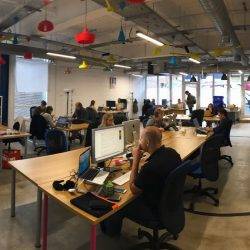February 19, 2018
Employers in the dark ages over recruitment of pregnant women and new mothers, report claims
 British employers are ‘living in the dark ages’ and have worrying attitudes when it comes to recruiting women, according to a new report from the Equality and Human Rights Commission. Claiming that many businesses’ attitudes are decades behind the law, the survey of 1,106 senior decision makers in business found around a third (36 percent) of private sector employers agree that it is reasonable to ask women about their plans to have children in the future during recruitment. The new statistics also reveal six in 10 employers (59 percent) agree that a woman should have to disclose whether she is pregnant during the recruitment process, and almost half (46 percent) of employers agree it is reasonable to ask women if they have young children during the recruitment process.
British employers are ‘living in the dark ages’ and have worrying attitudes when it comes to recruiting women, according to a new report from the Equality and Human Rights Commission. Claiming that many businesses’ attitudes are decades behind the law, the survey of 1,106 senior decision makers in business found around a third (36 percent) of private sector employers agree that it is reasonable to ask women about their plans to have children in the future during recruitment. The new statistics also reveal six in 10 employers (59 percent) agree that a woman should have to disclose whether she is pregnant during the recruitment process, and almost half (46 percent) of employers agree it is reasonable to ask women if they have young children during the recruitment process.













 Over half of UK workers (53 percent) say that the standard of technology is a key consideration for accepting a new job role and more than 1 in 3 (37 percent) would decline a job based on poor hardware alone, claims a new survey. The survey of over 2,000 British adults carried out by gadgets and technology e-tailer, LaptopsDirect.co.uk found that having the latest technology was valued more than other office perks, such as flexible working (45 percent), the working environment/decor (39 percent) and staff discounts (33 percent). Nearly a quarter of respondents (74 percent) overall, believe technology makes them more productive at work, with workers in marketing valuing technology the highest, with 84 percent of the votes, followed by those in creative and photographic (81 percent), information and communications (78 percent), professional services (73 percent) and education (71 percent).
Over half of UK workers (53 percent) say that the standard of technology is a key consideration for accepting a new job role and more than 1 in 3 (37 percent) would decline a job based on poor hardware alone, claims a new survey. The survey of over 2,000 British adults carried out by gadgets and technology e-tailer, LaptopsDirect.co.uk found that having the latest technology was valued more than other office perks, such as flexible working (45 percent), the working environment/decor (39 percent) and staff discounts (33 percent). Nearly a quarter of respondents (74 percent) overall, believe technology makes them more productive at work, with workers in marketing valuing technology the highest, with 84 percent of the votes, followed by those in creative and photographic (81 percent), information and communications (78 percent), professional services (73 percent) and education (71 percent).
 There have been 18 months of faltering net effective rents within the commercial office market in the Capital since the Brexit referendum, with ten of the 18 Central London office submarkets monitored in Cluttons’ latest London Office Market Outlook report registering rent falls in the final quarter of 2017, buoyed by additional incentives such as contributions to fit out costs and even delayed completions becoming commonplace in many locations. The report also raises concerns about the potential for an oversupply of serviced offices within the Capital. However, despite this and a perception that Central London offices are currently fully prices or possibly over-priced, by both occupiers and domestic investors, London remains a resilient city, continuing to attract high volumes of overseas capital. Employment growth is of course expected to be influenced by both the levels of GDP growth during 2018 and the Brexit divorce proceedings, which in turn will affect rental values. But says the report, aside from concerns over Brexit, there is no evidence from recruitment agencies to suggest a current, or planned exodus of finance and banking professionals from the City.
There have been 18 months of faltering net effective rents within the commercial office market in the Capital since the Brexit referendum, with ten of the 18 Central London office submarkets monitored in Cluttons’ latest London Office Market Outlook report registering rent falls in the final quarter of 2017, buoyed by additional incentives such as contributions to fit out costs and even delayed completions becoming commonplace in many locations. The report also raises concerns about the potential for an oversupply of serviced offices within the Capital. However, despite this and a perception that Central London offices are currently fully prices or possibly over-priced, by both occupiers and domestic investors, London remains a resilient city, continuing to attract high volumes of overseas capital. Employment growth is of course expected to be influenced by both the levels of GDP growth during 2018 and the Brexit divorce proceedings, which in turn will affect rental values. But says the report, aside from concerns over Brexit, there is no evidence from recruitment agencies to suggest a current, or planned exodus of finance and banking professionals from the City.














January 11, 2018
Culture shift needed to drive a better gender balance in property and construction
by Niki Fuchs • Comment, Property
(more…)